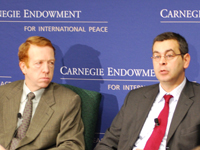Registration
You will receive an email confirming your registration.
Turkey has a potentially valuable role to play in supporting democracy and state-building in the Arab world, but questions about that role abound. Will Turkey work with the United States and Western Europe in this endeavor? What elements of the Turkish model of governance are most relevant to the Arab context? How will Turkey’s ambitions to contribute to Arab democracy fit with other Turkish interests in the region, and how will Arab societies react to a more active Turkish political role?
Carnegie hosted a panel discussion on the complexities and potential of the Turkish model in the Arab world with Carnegie’s Sinan Ülgen, Marwan Muasher, and Thomas de Waal. Carnegie’s Thomas Carothers moderated. The event marked the launch of Ülgen’s new paper, From Inspiration to Aspiration: Turkey in the New Middle East.
Understanding the Turkish Model
Ülgen identified five chief characteristics of the Turkish model:
- Secularism, Democracy, and Political Islam: The Turkish political system, despite all its shortcomings, has been able to accommodate both political Islam and the principle of secularism in democracy, Ülgen stated. Political Islamist actors in Turkey have gained experience from working in local government and have not resorted to violence.
- Civil-Military Relations: The Turkish military has played a major role as the watchdog for republican principles in the country. Ülgen argued that the stabilizing role of the military gave Turkish society the confidence to experiment with political Islam.
- Market-State Relations: The Turkish model is characterized by economic liberalization and trade integration, which have led to the development of a business class independent of the government, Ülgen observed.
- Links to the West: Since the founding of the Turkish republic, Turkey’s leaders have anchored Turkey in the West, seeking membership in Western multilateral organizations like NATO, the Council of Europe, and the European Court for Human Rights.
- State Traditions: Turkey has a long history of bureaucratic traditions carried over from the Ottoman Empire, which has led to popular confidence in the country’s institutions. Ülgen argued that this confidence has helped increase tolerance of dissent in the country.
Relevance of the Turkish Model
- Demonstration Effect: Turkey’s political and economic model may have a demonstration effect on the other countries of the region, Ülgen argued.
- Areas for Reform: Muasher argued that the Turkish model is not transferable en masse to countries in the Arab world. Instead, it should be viewed as a collection of potential areas for reform, with different elements that could be adopted in distinct places and times.
- Turkey’s Popularity in the Arab World: Ülgen cited polling that indicates that popular interest in a Turkish-style political system is growing in the region. However, Muasher suggested that the increased popularity of Turkey in the Arab world is largely the result of Turkish Prime Minister Recep Tayyip Erdogan’s stance on Israel, rather than Turkey’s style of democracy.
- Dissimilarities: The approach to secularism in Turkey will not find resonance in any Arab society, Muasher added. And the role of the military in most Arab countries is fundamentally different than in Turkey.
- Top-down Secularism: Ülgen agreed that the top-down model of secularism seen in Turkey would be very difficult to implement in most Arab countries today. If secularism were to take hold in the Arab world, he added, it would have to be bottom-up.
Operationalizing the Turkish Model
- Potential Areas for Reform: Ülgen highlighted a number of potential areas where the Turkish experience could be brought to bear in the Arab world:
- Political Parties: Informal contacts already exist between the Justice and Development Party (AKP) and many political parties in the Arab world.
- Trade Liberalization: The Turkey-EU customs region should be extended to the entire Middle East.
- Financial Sector: The Arab world should look to the type of reforms implemented in Turkey in the 1990s in order to increase growth and access to capital, Ülgen said.
- Housing: Public-private partnership allowed the Turkish government to develop mass housing and deliver it to the poorer parts of Turkish society.
- Political Parties: Informal contacts already exist between the Justice and Development Party (AKP) and many political parties in the Arab world.
- Challenges: The panel outlined a number of challenges to the applicability of the Turkish model.
- Azerbaijan: De Waal cautioned that similar arguments about exporting the Turkish model were made when Azerbaijan gained its independence from the Soviet Union and suggested that evaluating the capacity of the Turkish state to support reforms or influence outcomes abroad was also a determinant of the success of the model.
- Bad Reputation: Muasher emphasized that economic reforms must be implemented in an environment of political plurality. Previously, economic liberalization in the Arab world was conducted in a nontransparent fashion and, accordingly, it has a very negative connotation in those countries today.
- Azerbaijan: De Waal cautioned that similar arguments about exporting the Turkish model were made when Azerbaijan gained its independence from the Soviet Union and suggested that evaluating the capacity of the Turkish state to support reforms or influence outcomes abroad was also a determinant of the success of the model.
- Foreign Policy: Turkey’s ‘zero problems with neighbors’ policy collapsed during the Arab uprisings, Ülgen said. Currently, Turkey seems to be engaging in a more active foreign policy focused on influencing political outcomes and changing norms abroad. Ülgen added that Turkey’s state capacity has greatly increased in the last decade, facilitating Turkey’s ability to implement its now more expansive diplomatic vision.
